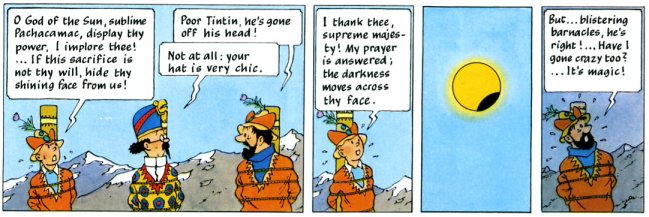Eclipse saves the day
 |
I was interested to hear a recent talk by Johnaton Nally about the eclipse. Johnathon relates the story of Christopher Columbus who, while stranded in Jamaica, used foreknowledge of a coming eclipse to his advantage. The natives initially helped Columbus and his crew, but they eventually tired of the treatment they received from the sailors and stopped supplying them with food. Columbus announced the the Almighty was unhappy and would show his displeasure by making the moon disappear. Of course, when the moon actually did disappear the natives were terrified and quickly changed their tune.
Whether or not this is true, its an interesting story and one that is repeated in other places in literature. In Mark Twain's 1889 novel "A Connecticut Yankee in King Arthur’s Court", Hank Morgan is sentenced to death by King Arthur's court but manages to save himself by predicting the coming eclipse at the precise moment he is about to be burnt at the stake. Fortunately, the events at the court coincided exactly with the historical solar eclipse of AD 528:
the monk raised his hands above my head, and his eyes toward the blue sky, and began some words in Latin; in this attitude he droned on and on, a little while, and then stopped. I waited two or three moments; then looked up; he was standing there petrified. With a common impulse the multitude rose slowly up and stared into the sky. I followed their eyes, as sure as guns, there was my eclipse beginning!
The life went boiling through my veins; I was a new man! The rim of black spread slowly into the sun's disk, my heart beat higher and higher, and still the assemblage and the priest stared into the sky, motionless. I knew that this gaze would be turned upon me, next. When it was, l was ready. I was in one of the most grand attitudes I ever struck, with my arm stretched up pointing to the sun. It was a noble effect.
A remarkably similar storyline is found in Herge's "Prisoners of the Sun". Tintin and Captain Haddock are captured by an "Inca" cult and sentenced to death for trespassing in a sacred temple. Fortunately, they are allowed to choose the time of their death. Even more fortunately, Tintin discovers a scrap of newspaper which reports on an upcoming expedition to study a solar eclipse. So in the end they manage to escape in the classic style as the eclipse saves the day.
Herge (1949), "Prisoners of the Sun", Mammoth Edition (2002) p58.
